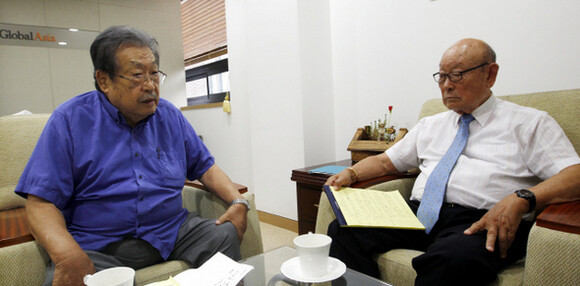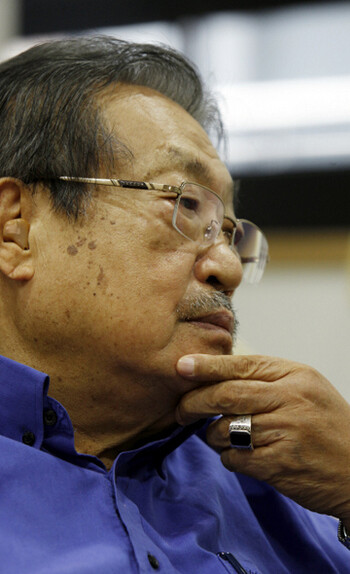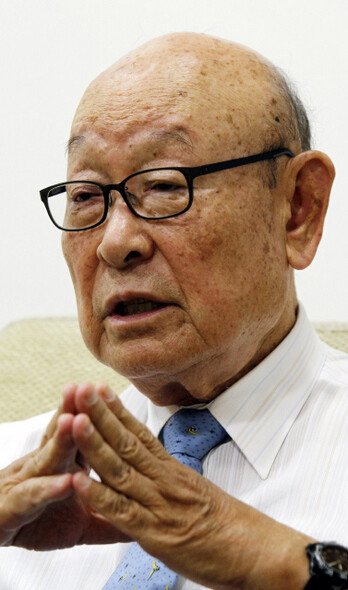hankyoreh
Links to other country sites 다른 나라 사이트 링크
[Interview] "For Japan to solve Dokdo at ICJ, it should also take other disputes "

The Hankyoreh recently spoke on the topic of Dokdo with two senior figures with decades of experience in Korea-Japan relations.
Former foreign minister Gong Ro-myung said even relatively progressive Japanese newspapers like the Mainichi were "so outraged they were running hatchet jobs treating President Lee Myung-bak like he’s insane."
Choi Suh-myun, chairman of the International Korea Research Institute, opined that President Lee's mentioning of the Japanese emperor differed from past behavior, noting, "Korea-Japan relations have worsened many times, but Japanese people have rarely expressed strong feelings like they are now."
Both men said Japan's claims to Dokdo are clearly wrong, but Korea must watch Japan’s moves in a levelheaded manner. With the Hankyoreh's Kang Tae-ho as moderator, these two elders held a roughly two-hour discussion on the morning of Aug 20 at the office of the East Asia Foundation in Seoul, where Gong serves as publisher of the foundation's quarterly journal, "Global Asia."
Kang: Would you please comprehensively evaluate the recent situation touched off by President Lee's August 10 visit to Dokdo and his comment regarding the Japanese emperor?
Gong: It's clear that the Japanese side provided the cause in President Lee's decision to visit Dokdo. Japan, however, is saying both sides provided cause, yelling that President Lee lit the fire, so I wonder if it might not be time for both sides to take a step back and coolly look at the situation. There's an annual Korea-China-Japan summit on the schedule when the ASEAN +3 summit convenes in Cambodia, but I that it might not happen in this tense situation.

Choi: There have been conscientious Japanese who thought positively, saying there was room to listen to the Korean side on issues like Dokdo and the comfort women. I wonder, however, if this has changed after President Lee’s visit to Dokdo and mention of the Japanese emperor.
Firstly, the Japanese think of their emperor very differently from the way Koreans view him. They view him so highly that at the end of World War II, when Japan was at a dead end following the atomic bombings of Hiroshima and Nagasaki, it still made protecting the emperor a condition of surrender. In a certain way, they view the emperor as something like an incarnation of Japan’s destiny.
Korean presidents have, while visiting Japan, asked the emperor to say something about the apology and reflection issue. Japan has accepted: President Chun Doo-hwan got an apology from Emperor Hirohito. When President Roh Tae-woo said the emperor had to apologize again, however, the Japanese side protested. They asked, "How many times must he apologize?" but after many twists and turns, the current emperor, Emperor Akihito, apologized again to reconfirm Hirohito's apology.
I wonder if perhaps Akihito's partiality to Korea played a part. In 2005, he became the first Japanese emperor to visit the Japanese war cemetery in Saipan where he attended a memorial ceremony. While he was there, he visited the memorial for Korean draftees located in a nearby forest and expressed condolences, which came as a surprise to those around him.
Prior to this, he had also revealed a blood relationship with Korea, saying in a press conference on his birthday in 2001, "I feel a certain kinship with Korea, given the fact that it is recorded in the Chronicles of Japan that the mother of Emperor Kammu was of the line of King Muryeong (462-523) of Baekje.
(Baekje was a kingdom located in southwest Korea. It was one of the Three Kingdoms of Korea, along with Goguryeo and Silla. Emperor Kammu (737–806) was the 50th emperor of Japan, according to the traditional order of succession. Kammu reigned from 781 to 806.)There was also the 2002 Korea-Japan World Cup, but to Japanese people, these sympathetic, pro-Korean statements from the emperor left a deep impression. President Lee's statement wasn't wrong, but it did cause quite the stir amongst Japanese familiar with the emperor's attitude on Korea.
Gong: The thing that summed up Japan's official apology and reflection in Korea-Japan relations was the "Japan-South Korea Joint Declaration" agreed upon by President Kim Dae-jung and Japanese Prime Minister Obuchi Keizo in 1998. In the declaration, Prime Minister Obuchi clearly apologized for Japan's past colonization of Korea in order to build an understanding that "to build a friendly relations in the 21st century, both sides needed to squarely face the past and develop a future-oriented and mutually cooperative relationship."
The problem is that because of repeated statements by Japanese cabinet ministers that seemingly negate this reflection and apology and visits to the Yasukuni Shrine, the declaration has been useless. Experts have therefore talked about a plan that would bring a final end to everything through a symbolic act like the Japanese emperor visiting Korea, but it seems President Lee's statement, made without mentioning this context, caused misunderstandings.
Choi: I think even if it comes late, a visit to Korea by the Japanese emperor must be resolved sometime as a historic task. The question I got asked the most during my 30 years in Japan was, "Every time something happens, Korea demands an apology. How many apologies must you get before your country is satisfied?"
I think Koreans remember Japan canceling its apologies, and Japan remembers only its apologies. If the emperor apologized, however, the cabinet has to go along with it, so I wonder if the problem might be that politicians aren't keeping the apology.
Kang: There has been progress in historical issues, but the problem has been repeated moves that negate this progress. Regarding the Dokdo issue, however, hasn't Japan maintained its claim of sovereignty?
Choi: Korean opinion has been of two minds. One is that Korea must aggressively attack Japan to resolve the Dokdo issue, and the other is a moderate position that hopes for a peaceful solution by taking time to deepen mutual interests since the Dokdo issue is not such an easy one to solve as it could spark a debate over sovereignty claims. I think the arguments of those calling for caution have won over more people.

Kong: In 2005 when the Dokdo issue surfaced, President Roh Moo-hyun said that he was ready to go to war and bashed the ‘silent diplomacy’ that the government had been carrying out on Dokdo until that point. It is made to look as if ‘silent diplomacy’ is somehow wrong. But the Dokdo issue is indeed a matter that is better addressed through silent diplomacy.
Since 1952 [then-President Rhee Syngman’s declaration of the peace demarcation] South Korea has administered the Dokdo islets. This should not be a problem for us. Why should we create the problem ourselves? Why do we make the mistake of creating such a difficult situation by unnecessarily irritating and encouraging radical behavior from Japan? I heard recently that a former undersecretary of the US State Department said something like, “Isn’t Dokdo an issue that Korea should just manage quietly?”
Those who practice international law talk about this “critical date” quoting precedents by the International Court of Justice (ICJ). That has meaning only for materials from the point before the dispute. It means that any material constructed after that point will not be a decisive factor in the judgment. It is for this reason that the declaration of the Peace Line in January 1952 is an important point and measures after that date by the administration will not be considered by the ICJ.
When I read about President Lee putting up a signpost to commemorate his visit, I thought to myself that it would have been better for him to erect a monument to remember the young men from Ulleung Island that in 1952 died to protect Dokdo. 30 youngsters and veterans during the Korean War put up their own money to buy weapons and created a volunteer garrison to protect the islets. Instead of commemorating his visit, the president should have commemorated them.
Kang: What do you think about Japan’s unilateral decision to refer Dokdo to the International Court of Justice?
Choi: If Japan says that it wants to solve this problem at the ICJ, I want to say that they should also peacefully solve the issue they have with the northern territories and the Senkaku islands at the ICJ. Above all, Japan is saying that Dokdo was no man’s land and they registered it in 1905. That’s the argument they want to put forward at the ICJ. That means, however, that Japan has to prove that Dokdo was indeed no one’s territory and because they can’t do that, they keep on lying.
Japan’s position on Dokdo follows an idea that a former director general of the Foreign Ministry Treaty Bureau put forward. Gawakami Kenzo said in a book he wrote, “One cannot see Dokdo from Ulleung Island but it is recorded in the historical records of the Choseon Dynasty (1392~1897) that the view is possible. But this is not true. Thus, the historical records are unreliable and cannot be recognized.”
However, when Dr. Lee Han-gi, an expert in international law was able to prove that indeed Ulleung Island was visible from Dokdo, the Japanese side stealthily changed its position. The Takeshima Institute in Simane Prefecture said “it is not important whether Dokdo is visible from Ulleung Island or not.”
Kong: A professor of Seoul National University once met Owada Hisashi, former Foreign Vice Minister and judge of the ICJ and said to him, “Why not have the Senkaku problem referred to the ICJ?” To this the judge said, “Why should it be referred to the ICJ, when it is our land?” I thought that was interesting. In 1904, a year before Japan registered Dokdo as its territory on the grounds that it was terra nullius, a fisherman in Simane Prefecture by the name of Nakai Yojaburo petitioned the government for registration of the island.
Upon this petition, the Home Minister studied the matter and found that there was a document that had been sent by Tokugawa to King Sook-jong in 1696 concluding that Dokdo was Chosun territory. That document has been confirmed as “Takeshima #1.” Also there is an official document dated 1877 (the 10th year of the Meiji reign) that states that sovereignty of Takeshima has nothing to do with Japan. Despite such documents, however, a year later Dokdo was registered as Japanese territory under the jurisdiction of the Simane Prefecture as a result of the Russo-Japan War. It was a scheme conspired by Yamaja Enjiro, an official of the Foreign Ministry and two other officials, one of the Naval Office and other the Forestry Office.
The three ordered the fisherman, Yojaburo, to submit the petition once again and this time, had the government accept it. The conspiracy was plotted to create a waterway that would be more advantageous for Japan. And this was the reason why President Roh Moo-hyun had said that the unilateral and forcible transfer of Dokdo as Japanese territory was the first step taken to invade Korea.
Choi: In order for Japan to justify the annexation of Dokdo, it must prove that it had indeed been unclaimed territory. But this will be difficult. According to the “Takeshima #1” document, there was a minor dispute because fishermen in Tottori Prefecture were fishing in the waters off Dokdo. The Japanese shogunate at the time did an investigation. After learning that Dokdo was Choseon territory, it banned the fishermen from fishing there. The authorities in Choseon in charge of relations between the two sides were notified of this.
The memo read, “Ulleung Island is close to Korea. There are Korean people living in the area. If many Japanese people lived there, it would be ours, but there is no sign of that.” Japanese people were then banned from going there.
It is time for Japan to respect its own words. This document is called the first ban on crossing the sea of Takeshima. The second ban was enforced by the Tokugawa shogunate who did not want their people to travel too far from their waters. In the 1800’s there was a ban of contrabandists who were trading using Ulleung Island as a stopover from Japan to Southeast Asia. Once caught, the head of the band was sent into exile and the rest were put to death. That’s how harshly the ban was enforced.
The third ban was during the Meiji era. The Daijokan (太政官) which was the Great Council of State in Japan during the Nara and Heian periods decided that the Ulleong Island and Dokdo Island as Korean territory. In 1868, Daijokan prepared a document in which the Ulleong Island and Dokdo Island was determined as Korean territory. Some people asked that the ban be lifted but this was denied. So, there is more material and evidence in the Japanese historical records that will in fact work in our favor and against Japan. The matter of territories, the research and the study must be left in the hands of the scholars. It is not the role of the government to instigate and excite the people and create unnecessary trouble and conflict.
Kang: Could you give some concluding remarks to the people of Korea and Japan?
Choi: Many political scholars say that historically speaking, when domestic politics are unstable, governments tend to create an outside enemy and makes strong remarks to distract citizens. The radical manner that the Japanese government is showing these days shows how unstable their domestic politics is.
However, we must not look at it only in that light because there are other factors that warrant attention. One is that Japanese people have become unusually agitated. We must remember that the Russo-Japan War began in a discussion among a small group of seven scholars. But the result was that the entire people united as one and they ultimately won the war. We must not take this lightly.
We must look rationally at how Japan is behaving. I personally am optimistic. For one, the friendly Korean attitude of the emperor, ordinary Japanese people’s perception of Korea thanks to the ‘Korean Wave.’ Taking into account that a total of 5 million Japanese visit Korea every year, I hope that the Japanese government will decide to pursue peace rather than conflict.
Kong: Diplomacy is about communication. In communication words are important. Because every single word has an impact and there is such a thing as diplomatic language. There is a saying in Korea that ‘in one word one can pay back a debt.’
Words should be used carefully. The remark about the emperor apologizing or Japan’s influence diminishing in the world, these kinds of comments should not have come out from the Blue House spokesman. Korea-Japan relations must evolve to a point where Japan reflects on the past and Korea shows generosity. A paradigm shift must take place. Korea today has a population of 50 million people with a per capita GNP of 20 thousand dollars. It is only the seventh country in the world to attain this status. There is more to the relations between Korea and Japan than Dokdo and comfort women. We cannot remain victims forever.
Please direct questions or comments to [englishhani@hani.co.kr]

Editorial・opinion
![[Editorial] Penalties for airing allegations against Korea’s first lady endanger free press [Editorial] Penalties for airing allegations against Korea’s first lady endanger free press](https://flexible.img.hani.co.kr/flexible/normal/500/300/imgdb/original/2024/0502/1817146398095106.jpg) [Editorial] Penalties for airing allegations against Korea’s first lady endanger free press
[Editorial] Penalties for airing allegations against Korea’s first lady endanger free press![[Editorial] Yoon must halt procurement of SM-3 interceptor missiles [Editorial] Yoon must halt procurement of SM-3 interceptor missiles](https://flexible.img.hani.co.kr/flexible/normal/500/300/imgdb/child/2024/0501/17145495551605_1717145495195344.jpg) [Editorial] Yoon must halt procurement of SM-3 interceptor missiles
[Editorial] Yoon must halt procurement of SM-3 interceptor missiles- [Guest essay] Maybe Korea’s rapid population decline is an opportunity, not a crisis
- [Column] Can Yoon steer diplomacy with Russia, China back on track?
- [Column] Season 2 of special prosecutor probe may be coming to Korea soon
- [Column] Park Geun-hye déjà vu in Yoon Suk-yeol
- [Editorial] New weight of N. Korea’s nuclear threats makes dialogue all the more urgent
- [Guest essay] The real reason Korea’s new right wants to dub Rhee a founding father
- [Column] ‘Choson’: Is it time we start referring to N. Korea in its own terms?
- [Editorial] Japan’s rewriting of history with Korea has gone too far
Most viewed articles
- 160% of young Koreans see no need to have kids after marriage
- 2Months and months of overdue wages are pushing migrant workers in Korea into debt
- 3[Editorial] Penalties for airing allegations against Korea’s first lady endanger free press
- 4[Guest essay] Maybe Korea’s rapid population decline is an opportunity, not a crisis
- 51 in 3 S. Korean security experts support nuclear armament, CSIS finds
- 6[Reporter’s notebook] In Min’s world, she’s the artist — and NewJeans is her art
- 7Bills for Itaewon crush inquiry, special counsel probe into Marine’s death pass National Assembly
- 8S. Korea discusses participation in defense development with AUKUS alliance
- 9Japan’s standards for use of preemptive counterstrike against N. Korea remain unclear
- 10Trump asks why US would defend Korea, hints at hiking Seoul’s defense cost burden